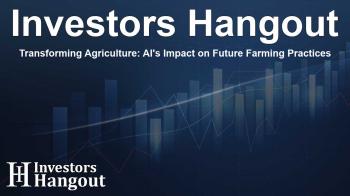Transforming Agriculture: AI's Impact on Future Farming Practices

Revolutionizing Agriculture with Artificial Intelligence
At a recent World Economic Forum gathering, Syngenta Group's CEO, Jeff Rowe, highlighted how artificial intelligence (AI) will fundamentally change agriculture by 2025. During an engaging panel at Bloomberg House, the session focused on integrating advanced technologies into agricultural practices for a sustainable future, illustrating how innovation holds the power to transform the agricultural landscape.
Key Trends in Artificial Intelligence
Syngenta has identified five key trends that illustrate AI's potential in agriculture, aiming to make farming more efficient and sustainable:
Advancements in Research and Development
The incorporation of AI into research projects at Syngenta is groundbreaking. Machine learning models are now essential tools for identifying new active ingredients for synthetic and biological products, ultimately enhancing agricultural efficiency.
AI-Driven Field Insights
AI applications are beginning to make significant impacts in-field management as well. With AI-powered systems, farmers can reliably monitor and predict soil health. This technology helps create detailed maps showing soil nutrients, texture, and carbon content, crucial for informed decision-making.
Empowering Farmers with AI Tools
GenAI-enabled digital tools are playing a crucial role in helping farmers optimize their crop management practices. These agronomic advisors aid farmers in making data-informed decisions, ensuring they adopt the best strategies for their crops’ health and productivity.
Precision in Pest Management
Targeting specific areas for pest control enhances efficiency in agriculture. AI is pivotal in precision agriculture, allowing farmers to use data-driven approaches when applying crop protection products, thus minimizing wastage and environmental impact.
Streamlining Supply Chain Management
AI is also transforming supply chains within agriculture. By providing accurate demand forecasting and market predictions, AI can help farmers reduce overproduction and waste. This streamlining of logistics not only enhances operational efficiencies but also supports greater profitability.
The Growing Influence of AI in AgriTech
With the global AgriTech market valued at over $24 billion as of recent estimates, its future growth is promising. Projections indicate that the sector could reach $54 billion by the late 2020s. Furthermore, the market for AI in agriculture is forecasted to grow significantly, underscoring the economic potential of integrating digital technologies into farming.
Experts at the World Economic Forum emphasized the need for collaboration among farmers, policymakers, and industry leaders to unlock the full potential of technological advancements in agriculture. Reducing barriers to technology access is vital for widespread adoption.
Through digital agriculture initiatives, farmers can proactively manage challenges posed by climate change and improve their yield capacities. This harmonious blend of technology and sustainable practices aims to create resilient food systems that benefit the environment and society alike.
About Syngenta Group
Syngenta Group stands out as a major player in agricultural innovation, with a workforce of approximately 60,000 dedicated to advancing technologies that empower farmers globally. Focusing on sustainability, Syngenta Group strives to enhance agricultural practices that not only meet the world's growing food demands but do so while caring for the planet.
With its management centered in Switzerland and operational facilities in multiple countries, Syngenta's contributions extend through various sectors, including crop protection and seed genetics. Its commitment to scientific discovery is reshaping agricultural outcomes for better productivity and sustainable practices.
Frequently Asked Questions
What is the primary goal of AI in agriculture?
The primary goal of AI in agriculture is to enhance efficiency and productivity through data-driven decision-making, ultimately supporting sustainable farming practices.
How does Syngenta Group integrate AI into its operations?
Syngenta Group utilizes AI in research to discover new products, monitor soil health, assist farmers in crop management, optimize pest control, and streamline supply chain functions.
What is the significance of the AgriTech market?
The AgriTech market represents significant economic potential, with projections for substantial growth reflecting the increasing importance of technology in enhancing sustainable agricultural practices.
How can farmers benefit from AI technologies?
Farmers can leverage AI technologies to improve crop management, optimize resource use, reduce pests, and increase overall productivity while minimizing environmental impact.
What does the future hold for AI in agriculture?
As technology continues to advance, AI is expected to play an increasingly central role in shaping sustainable agricultural practices, helping farmers adapt to changing environmental conditions and market demands.
About Investors Hangout
Investors Hangout is a leading online stock forum for financial discussion and learning, offering a wide range of free tools and resources. It draws in traders of all levels, who exchange market knowledge, investigate trading tactics, and keep an eye on industry developments in real time. Featuring financial articles, stock message boards, quotes, charts, company profiles, and live news updates. Through cooperative learning and a wealth of informational resources, it helps users from novices creating their first portfolios to experts honing their techniques. Join Investors Hangout today: https://investorshangout.com/
Disclaimer: The content of this article is solely for general informational purposes only; it does not represent legal, financial, or investment advice. Investors Hangout does not offer financial advice; the author is not a licensed financial advisor. Consult a qualified advisor before making any financial or investment decisions based on this article. The author's interpretation of publicly available data presented here; as a result, they should not be taken as advice to purchase, sell, or hold any securities mentioned or any other investments. If any of the material offered here is inaccurate, please contact us for corrections.
